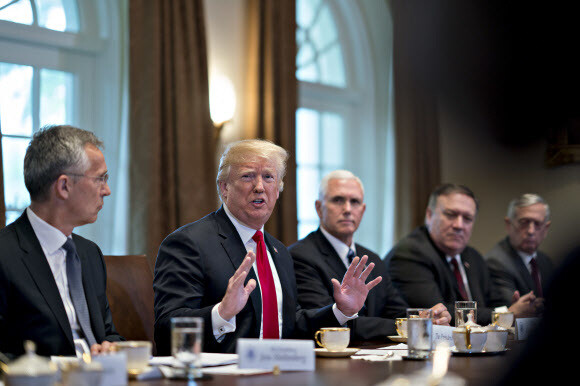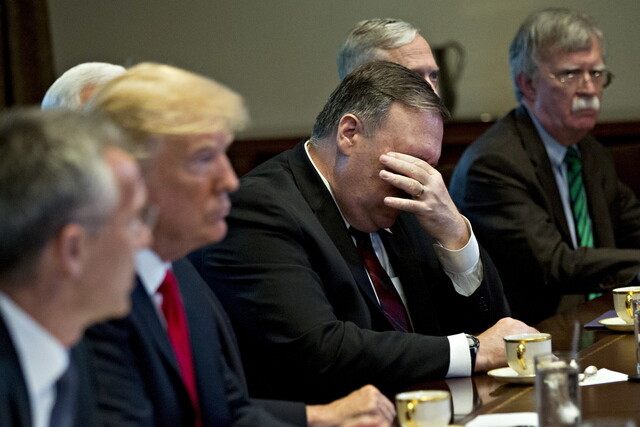hankyoreh
Links to other country sites 다른 나라 사이트 링크
Trump publicly rejects “Libyan model” of denuclearization after Bolton’s comments

US President Donald Trump went to work picking up the pieces after National Security Advisor John Bolton’s remarks about applying the “Libyan model” for North Korea’s denuclearization threatened to derail an upcoming summit with North Korea.
In his response, Trump rejected the Libyan model and declared plans to ensure the security of the regime in Pyongyang. With Trump clearly stating for the first time that the US intends to guarantee the regime’s security, many are now watching to see whether the summit preparations get back on track.
“The Libyan model isn't a model that we have at all when we're thinking of North Korea,” Trump soberly explained to reporters at the White House on May 17. While the occasion was a meeting with NATO Secretary General Jens Stoltenberg, Trump spoke for over 10 minutes on North Korea.
The “Libyan model” is commonly understood to mean initial denuclearization followed by rewards, but Trump dove straight into the what makes Pyongyang so dead set against it: the fact that Libyan head of state Muammar Gaddafi was slain by rebel forces in 2011 after honoring Libya’s denuclearization pledged and allowing the 2004 relocation of all nuclear equipment to Oak Ridge, Tennessee.
“The Libyan model was a much different model. We decimated that country,” Trump insisted. “We never said to Gaddafi, oh, we're going to give you protection, we're going to give you military strength,” he continued.
“The Libyan model that was mentioned was a much different deal,” he added.
Trump also referred to “decimation” in the cases of Iraq and Syria.
”Kim Jong-un will be very, very happy” if deal is made, Trump saysAt the same time, he stressed that guarantees would be in place for the Kim Jong-un regime’s security.
“We are willing to do a lot [in terms of regime security],” Trump said. “[A]ssuming we have the meeting and assuming something comes of it . . . [Kim] will get protections that are very strong.”
“This would be [. . .] something where he'd be there, he'd be running his country,” he explained.
“If we make a deal, I think Kim Jong un will be very, very happy.”
Trump’s remarks suggest he accepts that North Korea views the reference to the “Libyan model” as a threat, no matter what sense it was intended in. A statement issued on May 16 by North Korean first vice minister of foreign affairs Kim Kye-gwan expressed strong displeasure with the “Libyan model” reference and its speaker John Bolton, calling it a “move to impose on our dignified state the destiny of Libya or Iraq which had been collapsed [sic] due to yielding the whole of their countries to big powers.”
“[The] world knows too well that our country is neither Libya nor Iraq which have met miserable fate[s],” the statement said.
Trump also said the approach with North Korea “would be a South Korean model in terms of their industry.”
“His country would be very rich. His people are tremendously industrious,” he said, in a message that read as a reaffirmation of Secretary of State Mike Pompeo’s May 13 message about regime security and private sector investment. While Trump did send another message of pressure for Pyongyang to agree to denuclearization by suggesting that a situation along Libyan lines could take place if no deal is reached, his emphasis was on making sure the summit goes ahead as scheduled.

Trump did not go into detail on what his plan for guaranteeing the North Korean regime’s security would be. Last month, he gave his “blessing” to South and North Korea’s moves to declare an end to the Korean War. Typical approaches to guaranteeing North Korean regime security that have been discussed in the past include halting the deployment of strategic nuclear assets to the Korean Peninsula, reducing or withdrawing US Forces Korea, signing a North Korea-US nonaggression agreement, establishing diplomatic relations, and signing a peace agreement.
When asked about the possibility of USFK numbers being reduced, Trump replied, “I’m not going to talk about that.”
“We are going to say that [Kim] will have very adequate protection,” he said. The same day, the South Korean government said it had “confirmed in the defense cost-sharing negotiations on May 14–15 that the US does not intend to alter the scale or character of US Forces Korea.”
Institute for National Security Strategy senior research fellow Cho Sung-ryul suggested, “If North Korea says it can’t trust a mere statement or declaration, one possibility may be to attempt a resolution to allow a UN Security Council-level response to any act of attack against North Korea.”
By Hwang Joon-bum and Kim Ji-eun, staff reporters
Please direct comments or questions to [english@hani.co.kr]

Editorial・opinion
![[Column] A death blow to Korea’s prosecutor politics [Column] A death blow to Korea’s prosecutor politics](https://flexible.img.hani.co.kr/flexible/normal/500/300/imgdb/original/2024/0415/7517131654952438.jpg) [Column] A death blow to Korea’s prosecutor politics
[Column] A death blow to Korea’s prosecutor politics![[Correspondent’s column] The US and the end of Japanese pacifism [Correspondent’s column] The US and the end of Japanese pacifism](https://flexible.img.hani.co.kr/flexible/normal/500/300/imgdb/original/2024/0412/1017129080945463.jpg) [Correspondent’s column] The US and the end of Japanese pacifism
[Correspondent’s column] The US and the end of Japanese pacifism- [Guest essay] How Korea turned its trainee doctors into monsters
- [Guest essay] As someone who helped forge Seoul-Moscow ties, their status today troubles me
- [Editorial] Koreans sent a loud and clear message to Yoon
- [Column] In Korea’s midterm elections, it’s time for accountability
- [Guest essay] At only 26, I’ve seen 4 wars in my home of Gaza
- [Column] Syngman Rhee’s bloody legacy in Jeju
- [Editorial] Yoon addresses nation, but not problems that plague it
- [Column] Can Yoon and Han stomach humble pie?
Most viewed articles
- 1[News analysis] Watershed augmentation of US-Japan alliance to put Korea’s diplomacy to the test
- 2[Guest essay] How Korea turned its trainee doctors into monsters
- 3[Column] A death blow to Korea’s prosecutor politics
- 4[Photo] Cho Kuk and company march on prosecutors’ office for probe into first lady
- 5[Column] A third war mustn’t be allowed
- 6‘National emergency’: Why Korean voters handed 192 seats to opposition parties
- 7Exchange rate, oil prices, inflation: Can Korea overcome an economic triple whammy?
- 8After Iran’s attack, can the US stop Israel from starting a regional war?
- 9[Editorial] New KBS chief is racing to deliver Yoon a pro-administration network
- 10[Editorial] Stagnant youth employment poses serious issues for Korea’s future